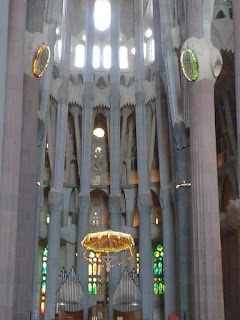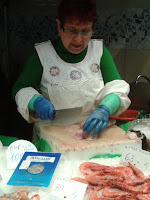3 museums that you have to hit in Paris are the Musee Rodin, the Musee D'Orsay and the Louvre.
 Kaleigh (niece) and I took the 69 bus from their location off of Blvd Sebastopol. The stop was just around the corner on Rue de Rivoli. Kaleigh seemed anxious to get going and the others weren't quite ready to go. So we went to the Army Museum which is part of Les Invalides to pay our respects at Napoleon's Tomb. It is quite an impressive tomb by any standard. It is surrounded by statues of Napoleon with various quotes about his leadership and what great things he had done for the country.
Kaleigh (niece) and I took the 69 bus from their location off of Blvd Sebastopol. The stop was just around the corner on Rue de Rivoli. Kaleigh seemed anxious to get going and the others weren't quite ready to go. So we went to the Army Museum which is part of Les Invalides to pay our respects at Napoleon's Tomb. It is quite an impressive tomb by any standard. It is surrounded by statues of Napoleon with various quotes about his leadership and what great things he had done for the country.We texted the rest of our group to see where they were and somehow they had gotten on the right numbered bus but were heading in the opposite direction. Judy was upset that I gave such incomplete directions on how to get to Rodin. They finally made it and we met them right at the bus stop otherwise they might still be walking in the wrong direction trying to find the museum.

 The gardens really interest me. There are some of his most famous works in the garden, like The Thinker, Burghers of Calais and the Gates of Hell. Even tho it is not in the middle of the growing season, there was plenty of green. The roses along every walkway were pruned back but will be really stunning when they bloom. The museum is made up of the entry way and courtyard, Rodin's private home and a large garden behind the "house". It is next to Les Invalides as can be seen in the photo.
The gardens really interest me. There are some of his most famous works in the garden, like The Thinker, Burghers of Calais and the Gates of Hell. Even tho it is not in the middle of the growing season, there was plenty of green. The roses along every walkway were pruned back but will be really stunning when they bloom. The museum is made up of the entry way and courtyard, Rodin's private home and a large garden behind the "house". It is next to Les Invalides as can be seen in the photo. We then walked to the Musee D'Orsay and ate lunch there. The cafe on the 5th floor is nice and convenient as we were pretty hungry. We were telling the young waiter that we first came to the D'Orsay when it was an abandoned train station. They had set up temporary stands in the station and we saw Harold et Maude there a long time ago. To look at the photos you could never imagine that it once was a grimey train station. They really do a great job of salvaging old buildings and converting them to something very contemporary.
We then walked to the Musee D'Orsay and ate lunch there. The cafe on the 5th floor is nice and convenient as we were pretty hungry. We were telling the young waiter that we first came to the D'Orsay when it was an abandoned train station. They had set up temporary stands in the station and we saw Harold et Maude there a long time ago. To look at the photos you could never imagine that it once was a grimey train station. They really do a great job of salvaging old buildings and converting them to something very contemporary. There are so many recognizable masterpieces in this museum that one can't take pictures of all of them. This one kind of hit home with me after my previous rendez-vous chez le dentiste. I wonder if this woman's teeth are still hurting to this day.
There are so many recognizable masterpieces in this museum that one can't take pictures of all of them. This one kind of hit home with me after my previous rendez-vous chez le dentiste. I wonder if this woman's teeth are still hurting to this day. I always like looking at the model of the Opera Garnier opera house at the back of the museum. It even has the controversial (at the time) ceiling by Marc Chagal. The detail is amazing and people are always surprised to see the how little of the opera house is dedicated to seating. The largest part is the stage.
I always like looking at the model of the Opera Garnier opera house at the back of the museum. It even has the controversial (at the time) ceiling by Marc Chagal. The detail is amazing and people are always surprised to see the how little of the opera house is dedicated to seating. The largest part is the stage.Plus, you get a great view of Sacre Coeur from the top of the museum
.

 The Pyramid entrance into the Louvre is another great example of using imagination when solving the problem of entering the museum. Before the Pyramid, there were multiple entrances to visit all the different galleries, or at least it was very difficult getting from one major part to another. It is a huge set of buildings that evolved over time into the one big, horseshoe shaped Louvre. There are administrative offices as well as multiple floors of galleries holding paintings, mainly from France, Italy, Holland and Spain. Plus there are rooms with thousands of ancient artifacts and other galleries with nothing but immense sculptures.
The Pyramid entrance into the Louvre is another great example of using imagination when solving the problem of entering the museum. Before the Pyramid, there were multiple entrances to visit all the different galleries, or at least it was very difficult getting from one major part to another. It is a huge set of buildings that evolved over time into the one big, horseshoe shaped Louvre. There are administrative offices as well as multiple floors of galleries holding paintings, mainly from France, Italy, Holland and Spain. Plus there are rooms with thousands of ancient artifacts and other galleries with nothing but immense sculptures.There are signs pointing to the Big Three (Moan Lisa (aka Mona Lisa), Winged Victory and Venus de Milo) where there are massive crowds, but many of the other galleries are not crowded at all.
 It is amazing what they have done with the interior to handle the movement of crowds. They must have gutted a part of the interior to install escallators to get people up and down from floor to floor.
It is amazing what they have done with the interior to handle the movement of crowds. They must have gutted a part of the interior to install escallators to get people up and down from floor to floor.There are still many stairways and if you want to go up a flight you could find yourself having to go down one set of stairs to then climb another set to reach your destination. Maybe a remnant of the original buildings.
While walking in one of the lesser galleries, we saw some workers moving a piece, perhaps from storage. I took a quick shot of the back but when I tried to photograph the actual painting, the two women holding clipboards asked me not to take any pictures. I took a look at the painting but had no idea who could have painted it. Maybe it was going back into storage.
A bit later, I shot this picture of a woman copying a small masterpiece. There were a few other people in the museum doing the same thing. Only after I took the photo did I see the piece of paper on her easel with the "NO CAMERA" icon. Oh well...

















































